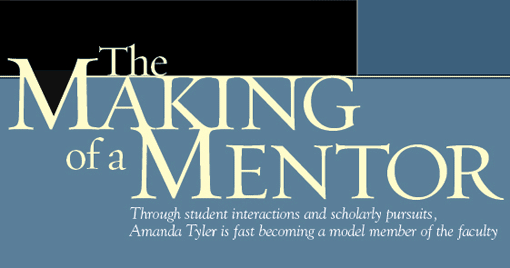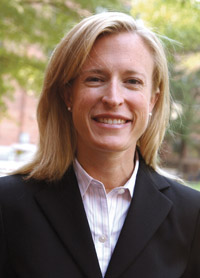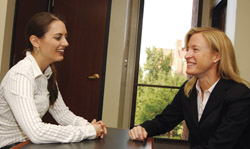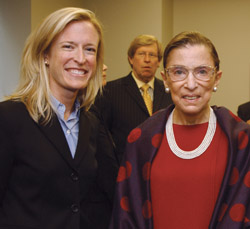|

By Laura Ewald
Photos by Julie Woodford
When associate professor Amanda Tyler interviewed
with different law schools in 2004, transitioning
from a successful appellate practice in federal
and state courts with Sidley & Austin back
into academia, she saw something different at
GW Law. “I noticed when talking to the
faculty here that, although they were all interested
in questions of scholarship and asked about my
writing and scholarly agenda, they also talked
a lot about teaching,” Tyler says. “The
craft of teaching is so important here, and I
had not seen that kind of emphasis at some of
the other schools I visited.”

|

Amanda Tyler,
in her second year at GW Law, teaches
civil procedure and federal courts
and the federal system.
|
Now in her second year at GW Law, where she
teaches civil procedure, federal courts and the
federal system, is a member of the clerkship
committee, and serves as faculty adviser to the
Van Vleck Constitutional Law Moot Court Competition,
Tyler is enjoying the role of mentor. She also
works to bring inspiring visitors—such
as Supreme Court Chief Justice John Roberts,
who will visit in the spring, and Justice Ruth
Bader Ginsburg, who delivered the keynote address
at the symposium on the legacy of Chief Justice
William Rehnquist in October.
In addition to learning from instructors at Stanford
and Harvard Law, she enjoys the lasting impact
of clerkships with Guido Calabresi of the U.S.
Court of Appeals for the 2nd Circuit and Ginsburg.
Perhaps because they had been educators themselves,
Calabresi a former dean of Yale Law School and
Ginsburg a professor teaching civil procedure,
Tyler says each took a personal interest in her
educational and career development.
“I encourage my students to clerk as an
extension of their law school careers. I describe
the range of cases I saw, the lifelong career
mentors I gained,” Tyler says. “My
experiences as a clerk certainly inform my teaching.
It was interesting—and a heck of a lot
of fun—to be a fly on the wall of the Supreme
Court.”
Tyler inspired 3L Jennifer Mascott to apply
for a clerkship and supported her during the
application process—Mascott will clerk for 4th Circuit
Judge J. Michael Luttig next year.
“Professor Tyler’s clerkships at
the highest levels of the federal judiciary and
her participation on the GW Law School’s
clerkship committee helped to encourage me in
my application for a federal clerkship position,” Mascott
says. “Professor Tyler is very accessible
to students outside of the classroom. Her wide-ranging
experience makes her a great role model for her
students. She is kind and insightful, and on
a personal level, Professor Tyler has provided
me with beneficial advice on professional issues
ranging from judicial clerkships to more foundational
matters such as the balancing of work and family.”

Tyler offers advice to 3L Jennifer Mascott, who says Tyler is “very
accessible to students outside of the classroom.” With Tyler’s
help, Mascott secured a clerkship for 4th Circuit Judge J. Michael Luttig.
|

|
Inside the classroom, Tyler is interested
in bringing practical experience to legal
education. As a clerk for Calabresi in 1998,
Tyler gained exposure to a major decision
involving the Prison Litigation Reform Act;
under Ginsburg in 1999, during what Tyler
calls “one of the most
exciting Supreme Court terms in recent history,” she
worked on a range of cases involving, among
other things, First Amendment issues and
statutory interpretation. During her time
at Sidley, colleagues noticed the impact
of her clerkship experience on her performance.
“Certainly, the appellate clerkship experiences
were invaluable for the appellate projects Amanda
handled at Sidley; but more importantly, Amanda
brought a rigor and discipline to her work that
I am certain reflect her time with both of her
former bosses,” says Carter Phillips, managing
partner of Sidley’s Washington office and
Tyler’s former colleague. Phillips also
says Tyler’s enthusiasm, intellect, and
charisma will translate well into her teaching
career.
Having practice experience from Sidley
has been invaluable as she helps her students
expand their knowledge of the law and of
the practice of the law. “Law school inherently prepares students
for their careers because what we are trying
to do is teach the students how to think like
lawyers, write like lawyers, and master the art
of time management,” Tyler says. “But
I also try to prepare them for what I experienced
when I entered the professional world that I
don’t think can be learned in a classroom.
“In the last 10 years, there has been a
greater emphasis on billable hours and baseline
requirements. Your productivity within the firm
is monitored, and that makes how you use your
time very important. It has become even more
important to learn to balance all the different
factors in your life, be they personal obligations
or scholarly interests or the desire to do pro
bono work. As an educator, I try to make my students
aware of this balancing act and prepare them
for that aspect of the practice culture.”
James Youngs, a 2L who last summer worked
for Tyler’s former law school roommate Rachael
Brand, assistant attorney general for the Office
of Legal Policy in the Department of Justice,
says he enjoys the practical advice he gains
in her classroom.
“It was always Professor Tyler’s
focus to relate the issues that we were dealing
with in class back to real legal problems. Her
recent experience in private practice offered
a refreshing look into life as an attorney. She
used examples from ‘real-life’ lawyering
to give us confidence, as well,” Youngs
says. “As a practical matter, Professor
Tyler impressed upon us the fact that being a
great lawyer means having a good sense of humor,
being a great colleague, approaching whatever
you do with a lot of confidence, and ticking
off judges as little as possible.”

|

Tyler with Supreme
Court Justice Ruth Bader Ginsburg,
who delivered the keynote address at
the GW Law symposium on the legacy
of Chief Justice William Rehnquist.
Tyler clerked for Ginsburg after graduating
from Harvard Law.
|
Although much of her time and energy
is now focused on her students, Tyler
continues to develop her writing and
scholarly interests. Although she did
take leave from Sidley to conduct research
at Georgetown University Law Center in
2003, she says having time to focus on
her own scholarship was one reason she
pursued a career in education. “Being
in an academic setting enhances one’s ability
to write—that was hard for me to do while
I was still in practice,” Tyler says. “But
now, I have the resources of the Law
School and have more time to pursue writing.”
She was named co-winner of the 2005 American
Association of Law Schools Outstanding Scholarly
Paper Award for “Continuity, Coherence,
and the Canons,” Volume 99 Northwestern
Law Review. The article delves into the challenge
posed to courts when they are called on to interpret
statues: courts must balance their creative role
in improving law with the role of guarding the
law’s continuity and coherence. Tyler’s
article promotes the guardian’s role as
paramount when courts are called upon to interpret
ambiguous statutory mandates. Current projects
include an article discussing the role of the
federal courts in reviewing congressional decisions
about the detention of prisoners in the war on
terrorism. Tyler expects to continue writing
about statutory interpretation and the role of
judicial review in our constitutional structure,
and likely will continue with her early focus
on habeas corpus jurisprudence. She also served
as one of the faculty advisers on the fall Law
School symposium on Rehnquist.
“Amanda Tyler is a delight to have on the
GW Law faculty. She is a great team player—she
has helped considerably in organizing the panel
on federalism that will be part of the symposium,” says
Chip Lupu, associate dean for faculty development. “She
has helped us to lure very prominent judges to
participate in several GW Law events.”
High on that list of prominent judges
are recently confirmed Supreme Court
Chief Justice John Roberts, who will
judge the Van Vleck Constitutional Law
Moot Court Competition at GW Law on Feb.
9, as well as Ginsburg, who spoke to
a packed house in October (see page 4).
Looking forward to her third year of teaching,
Tyler hopes she can “keep up the level
of energy and enthusiasm I’ve had for the
Law School in my early days here.” As a
mentor from Harvard Law once told her, “Great
legal legacies are often most visible through
the work of those you teach.”
|